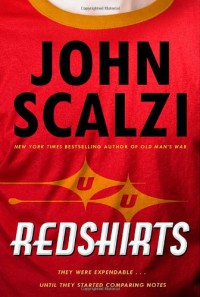A Total Inability To Connect
 Writing: 3.5
Writing: 3.5Story/Plot: 3.5
Depth/Detail: 3
Enjoyment: 2.5
Let me preface this by saying I really like John Scalzi, I've enjoyed his other books that I've read, and I've invested in hard copies of pretty much every book he's written, either because I've read them or because I plan to read them. I would call myself a fan.
Redshirts is a hilariously awesome concept for a book, obviously for anyone who grew up watching Star Trek and can relate to the concept of Ensign Expendable - the poor ensign who comes on every mission for no good reason, whose sole purpose seems only to die. In this book, a group of ensigns on an oddly familiar starship begin to question why it seems like there is an extremely high fatality rate among the ensigns on away missions, specifically when they go on missions with specific crewmembers. Who conveniently match up fairly well to the generic crews from Enterprise. During the build up to them figuring this process out, there are lots of hilarious little pop-culture nugget references and things that make you, at the very least, smile or giggle (the magic microwave anyone?). It contains Scalzi's signature prose and often hilarious subject choices, and generally keeps a smile on your face.
However, as the store progresses, I feel like it meanders a bit too much, especially for a story that's so short. All of the concepts are funny and interesting, but left me feeling like they could have been so much more, like it was lacking some "oomph". Some of the references feel like they're there for cheap laughs or to endear the book to a certain demographic. Normally, I'm perfectly OK with this (see Ready Player One, which is easily one of my favorite books ever), but both myself and the person I was "reading" this with felt the same way - they were good for some yuks but sometimes felt like not much more.
Really, it's honestly hard to quantify what about the story was bad - the whole concept that a cheesy TV show written in this time period has a direct correlation with real life people in the future is funny, creative, awesome. But the presentation just wasn't there for me. Maybe I just had too high of expectations - after Ready Player One, I guess I had high hopes for a nerd pop-culture themed book, specifically by an author I already know I enjoy. And in a lot of ways, it did deliver. But in a lot of ways it didn't. It's hard to review a book and say "most everything was enjoyable, but just something about it wasn't working for me, you know?". That's not really scientific or objective, but it's what I left with.
The story itself was a bit too short, and the book was rounded out by two codexes - one that was in a diary form, about the writer of the show after he is confronted by the future crewmembers, going through a bit of an existential crisis and writer's block based on the fact he realized he's actually killing people and that his writing is shit. This portion is rather entertaining, however does seem to wander a bit and drags on just a tad.
The second codex is the producer of the show's son, who is in an accident and whose life is 'saved' by some creative work with the plot of the show and time travel. It's an interesting bit that brings up some great points about the plot - it was kind of nice to explore those lapses in detail rather than just leaving the reader to go "wait a minute...". However, this section is extremely awkwardly written - it's essentially through a first person perspective, except it's written as if it's being narrated directly to the character. "you stood in front of the mirror, but not because you're narcissistic". "You said to her", etc. I just found it...awkward, cumbersome, difficult to maneuver. The ending of this portion was some deeper, sappier love stuff, some growth of the characters into real people, giving the story some depth beyond what it was. While this section had it's merits, and should have really rounded the book out for me, it ended up that it felt extremely out of place based on the tone of the rest of the book.
In the end, you ended up with a bit of a jumbled mess - a story with great ideas that needed some presentation polish. A bit of a time-jump continuity piece that was funny and entertaining, but drug on a bit. And a final piece that brought up some good points but felt like a departure from the rest of the book. Redshirts could have been truly epic, but I left it feeling like it just let down a bit.
And for those audiobook listeners - it's still a good listen, and is a book that suits itself to being read very well (Scalzi's books are all this way). And it's read by Wil effing Wheaton - seriously, not only is WIl an awesome narrator, but WHO ELSE WOULD YOU PICK IN THIS SITUATION? That is all.



